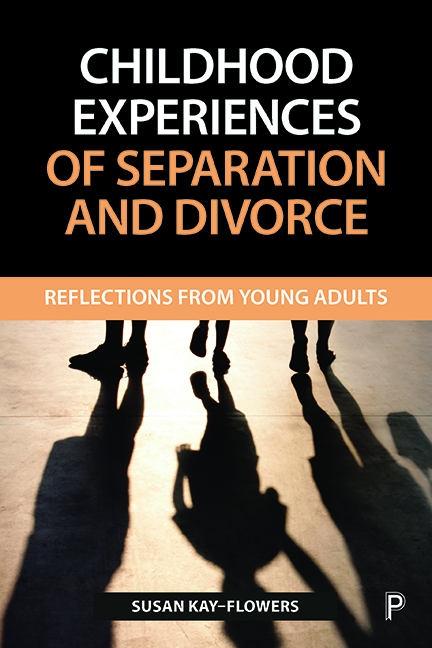Book contents
- Frontmatter
- Dedication
- Contents
- Figures and tables
- Acknowledgements
- One Introduction
- Two What is known about children’s experience of parental separation and divorce?
- Three The research study
- Four Constructing a new framework for understanding children’s accommodation of parental separation
- Five Setting the context for the framework: emotions
- Six Reactions
- Seven Support
- Eight Communication
- Nine Conflict
- Ten Future directions
- References
- Appendices
- Index
Five - Setting the context for the framework: emotions
Published online by Cambridge University Press: 27 April 2022
- Frontmatter
- Dedication
- Contents
- Figures and tables
- Acknowledgements
- One Introduction
- Two What is known about children’s experience of parental separation and divorce?
- Three The research study
- Four Constructing a new framework for understanding children’s accommodation of parental separation
- Five Setting the context for the framework: emotions
- Six Reactions
- Seven Support
- Eight Communication
- Nine Conflict
- Ten Future directions
- References
- Appendices
- Index
Summary
Case study:
Emily's story
Emily (Respondent 12) is 19 years old, her parents separated recently, just after she moved to another city to study at university. Her mother told her about the separation a few weeks before her father left the family home. She explained:
‘this has only just happened to me and I am very shocked. They seemed happy enough when I came to university in September so I don't know what has happened while I have been away. I am an only child so there is no one else to talk to about what has changed.’
She described her initial feelings as ‘very sad’ and ‘shocked’ and how she ‘worries about how things will be in the future…‘everything is so strained and sad at home.’
She moved to university in September and lives in halls:
‘but when I go home at Christmas only Mum will be there. I will see Dad but he is living in a rented flat so it will be very strange.’
She was able to talk to her friends about the separation but having moved away from her home town she said
‘It is difficult because I have just moved to *** and so I’ve left my friends at home behind. I have mentioned it to some of the friends I have made while I have been here but it's hard because they don't know me well.’
She described how her parents’ separation had affected her ability to concentrate:
‘I have found it difficult to do my work and to settle in halls since I heard they were separating. I feel like I should be at home but my parents want me to continue with my university life. I wonder if they were ever happily married or just waiting for me to leave home.’
She was thinking ‘of going to see a counsellor if I don't feel any better after Christmas’ because she would be able ‘to get advice and support which is independent and confidential’.
Emily had a low level of accommodation.
This chapter describes children's initial emotional responses on finding out that their parents were separating, in doing so it sets the context for understanding the themes emerging from their accounts which are considered in detail in the following chapters on reactions, support, communication and parental conflict.
- Type
- Chapter
- Information
- Childhood Experiences of Separation and DivorceReflections from Young Adults, pp. 87 - 102Publisher: Bristol University PressPrint publication year: 2019



